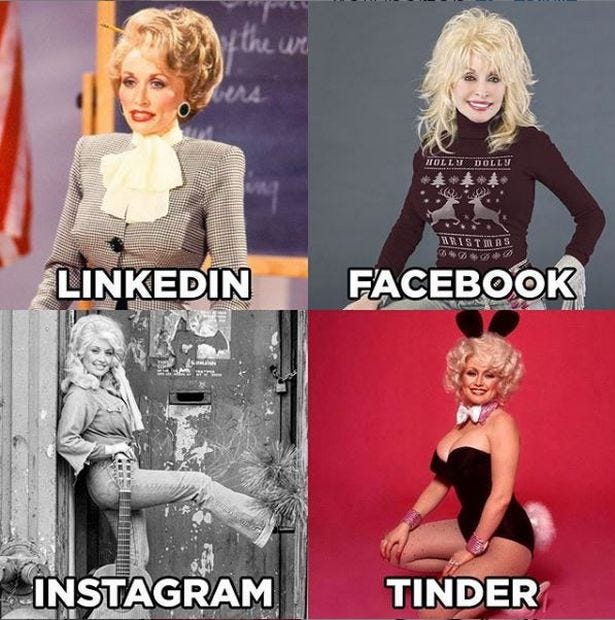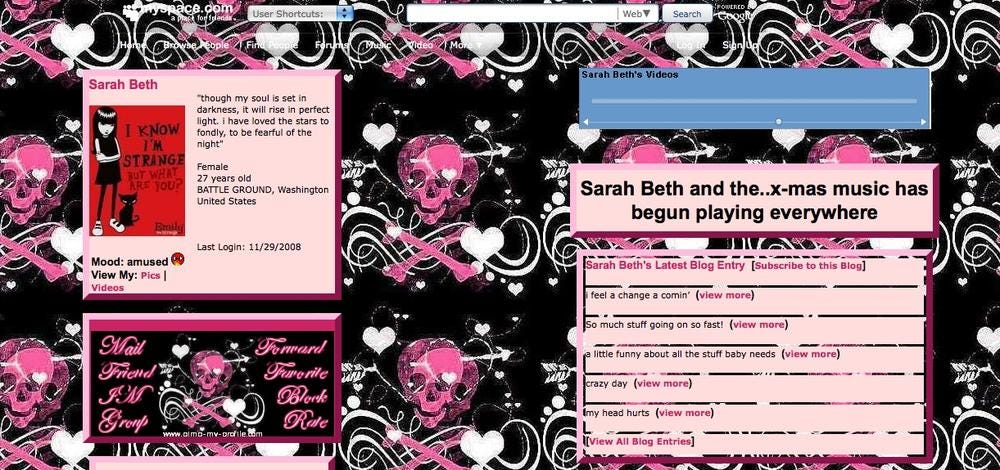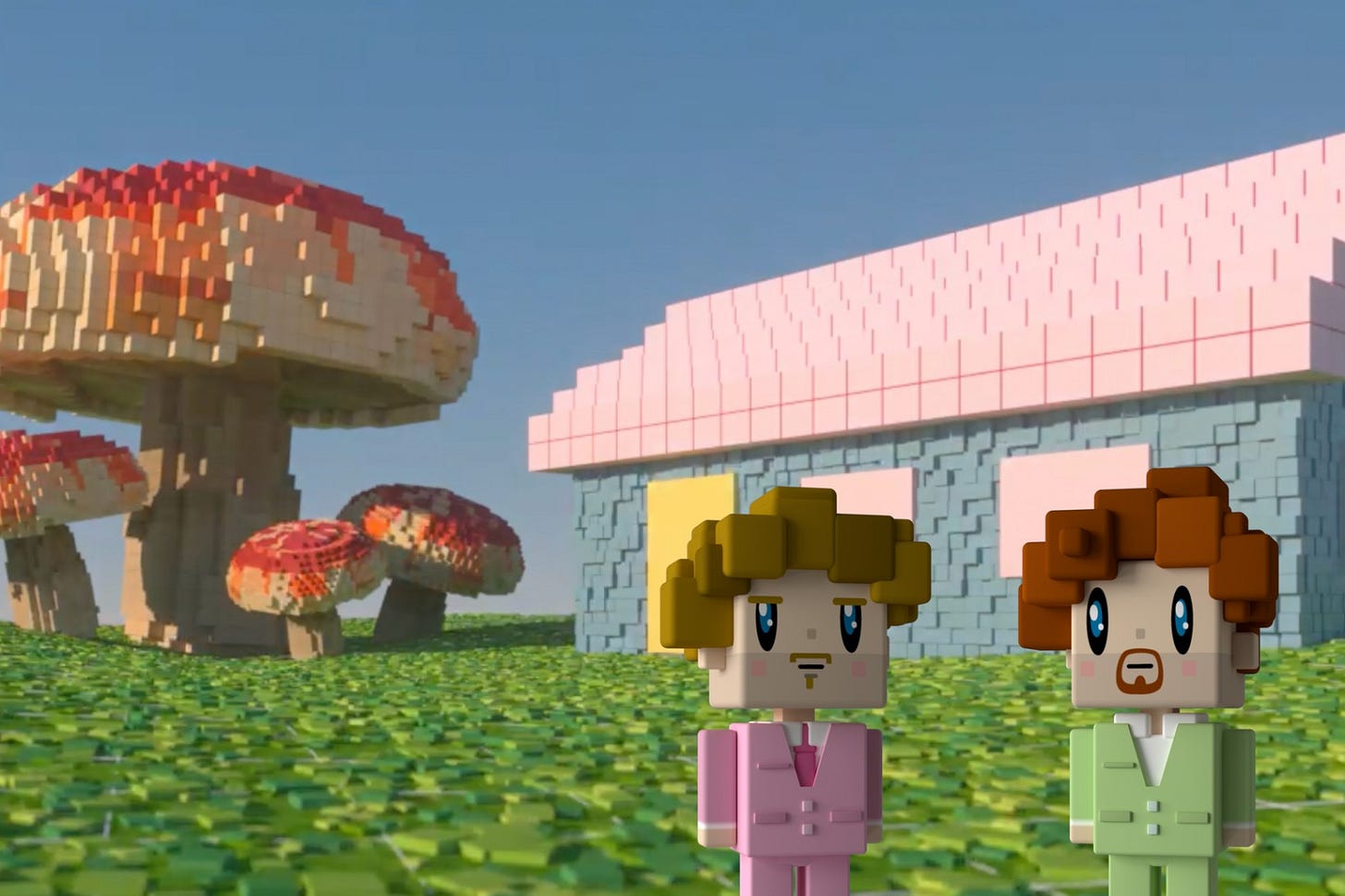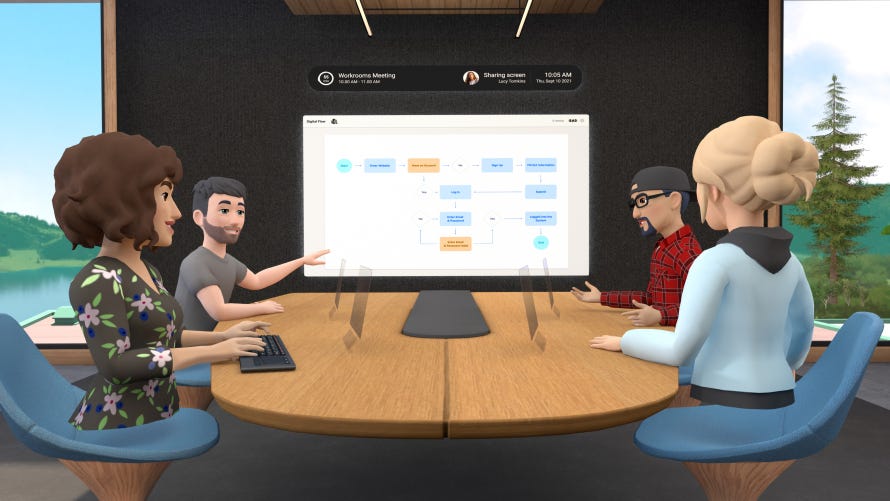Back to the Future: Myspace and Gen Z Digital Identity
Embracing Customizability and Consistency
This is a weekly newsletter about how people and technology intersect. To receive this newsletter in your inbox each week, subscribe here:
Back to the Future: Myspace and Gen Z Digital Identity
On January 21, 2020, Dolly Parton posted a four-panel image to her Instagram, captioning it, “Get you a woman who can do it all.” The Dolly Parton Challenge was born.
The challenge immediately went viral (the post remains Parton’s most-liked photo), with other celebrities joining in. Ellen DeGeneres posted her version of the challenge. Oprah and Sylvester Stallone followed suit. Even Doug the Pug got in on the fun.
What’s so interesting about the Dolly Parton Challenge is how it conveys something that everyone implicitly understands: we all have disparate identities across the internet. My colleague Georgia wrote about this when introducing our investment in Linktree, which helps you have a consistent identity in such a disjointed online world.
Disparate identities are orthogonal to Mark Zuckerberg’s original conception of social media. From David Kirkpatrick’s The Facebook Effect:
“You have one identity,” [Zuckerberg] says emphatically three times in a single minute during a 2009 interview. He recalls that in Facebook’s early days some argued the service ought to offer adult users both a work profile and a “fun social profile.” Zuckerberg was always opposed to that. “The days of you having a different image for your work friends or co-workers and for the other people you know are probably coming to an end pretty quickly,” he says.
He makes several arguments. “Having two identities for yourself is an example of a lack of integrity,” Zuckerberg says moralistically. But he also makes a case he sees as pragmatic—that “the level of transparency the world has now won’t support having two identities for a person.” In other words, even if you want to segregate your personal from your professional information you won’t be able to, as information about you proliferates on the Internet and elsewhere.
Zuckerberg’s conviction in a single identity led him to require real names on Facebook. In the late 1990s and early 2000s, online identity was pseudonymous: on AOL Instant Messenger, you were soccergirl7 or doglover42. (I’m sorry to say that I was sexyrexy3617—a friend convinced me that it would be both funny and cool. It was neither.) By mandating real names, Facebook subtly suppressed self-expression.
Facebook’s standardization was a departure from Myspace’s customizability. In the words of Dmitry Shapiro, Myspace’s CTO:
When you go out to a bar, you don’t put on a white and blue uniform, a Facebook uniform. You’d put on all sorts of amazing things to stand out. You’d want to be radically different from all others. And that was the real value of Myspace. When people talk about missing Myspace, they miss customizing their profile.
Myspace was a chaotic collision of colors and styles and fonts. You painstakingly crafted your profile, from the wallpaper to the music that would auto-play when you got a visitor. (My Myspace profile was set to Akon’s “Don’t Matter”). Before Facebook stripped away personalization, Myspace gave users a venue for creativity and self-expression.
Gen Zs today are embracing two new tenets of digital identity: customizability and consistency. Customizability reclaims the self-expression of Myspace. Digital natives gravitate toward products that let them stand out online, a rejection of Facebook’s white-and-blue uniforms.
Scout, for example, is building 3D virtual rooms that users can fully customize and curate, all in the browser. Scout’s founder, Zack Hargett, calls Scout “Myspace for the Roblox generation.” (Scout also has one of the coolest landing pages out there.)

Young people already spend hours a day immersed in digital experiences: the average Roblox daily active user spends 2.6 hours a day in Roblox. And 345,000 Roblox users are also creators. In last week’s Q2 earnings report, Roblox announced that the platform is getting less concentrated, as the long tail of game developers build popular experiences: “In Q2 last year, 50% to 80% of the Robux were coming from the top 10 experiences. That number is now 37%.”
The digital native generation is being trained to customize rich, complex virtual worlds. These worlds are returning to the chaos and agency of expression on Myspace. Scapin’, for instance, lets anyone create customized virtual spaces to hang out with friends or strangers. In some ways, it’s Roblox for adults. Other startups, like Dreamworld and Manticore Games, are blurring the lines of sandbox games, social networks, and customized virtual spaces.
The return of customizability intersects with new tools that better equip people to personalize digital identity. Companies like Figma, Canva, and Kapwing offer accessible products that let anyone manipulate software for their own self-expression. Content platforms like TikTok embed creator tools into the app. There’s no longer a need for specialized knowledge of Adobe Premiere—you can make professional-grade content with native editing tools and special effects. Gen Zs reject the sterile, constrained online identities encouraged by older social platforms in favor of more customized forms of online expression.
The other key component in Gen Z digital identity is consistency. The Dolly Parton Challenge signals how older generations—Millennials, Gen Xers, Boomers—were taught to behave differently on different platforms. On LinkedIn, you’re professional; on Facebook, you’re family-friendly; on Instagram, you’re stylish; on Tinder, you’re sexy. For Gen Zs, online identity is consistent across platforms; authenticity and self-expression are paramount, and not platform-dependent.
Take LinkedIn. Gen Zs view LinkedIn as a cringeworthy, out-of-touch place for older internet users to subtly (or not-so-subtly) humblebrag. Some Gen Zs even hilariously troll LinkedIn with satirical posts. They proudly announce their new job at The Krusty Krab Restaurant, a “prestigious establishment” that will offer “a new chapter in [their] life.”
Or they announce their new status as the CEO of a billion-dollar company.
These posts embody Gen Z’s exhaustion with the status-seeking, back-patting, clout-chasing DNA of social media. Digital natives would rather have a single consistent identity threaded across platforms. Zuckerberg was right when he said, “The days of you having a different image for your work friends or co-workers and for the other people you know are probably coming to an end pretty quickly.” And he was right when he said, “The level of transparency the world has now won’t support having two identities for a person.” He was just 10 years early.
New startups are building Gen Z platforms. Polywork, for instance, is a Gen Z LinkedIn—a blended social network and professional network that’s less cringe-worthy and more authentic. It’s a single destination to showcase your identity—personal and professional.
This builds on the recent trend of “TikTok resumes”—young workers seeking employment with short, expressive videos about their skills and work experience. At first, the practice was informal and user-driven, but TikTok has now formalized the feature.
New startups let young people build a consistent, personalized identity across the internet. Linktree (an Index investment) is the leading link-in-bio site with 12 million users, offering a connective tissue for digital identity. Universe is a mobile-first website builder that lets you spin up a personal website with just your smartphone. And Koji, founded by the former Myspace CTO quoted above, lets you launch your own site by assembling Lego-like component parts.
The next generation of internet users wants customizable and consistent digital identities—a reaction to the uniform, dull, and inconsistent identities of the last decade. The companies that undergird the next era of online expression will embrace Gen Z’s ethos of creativity, self-expression, and unabashed authenticity.
Final Thoughts
It’s easy to forget how rapidly and how dramatically the digital generation has migrated online. 12th graders in 2015 were already going out less often than 8th graders in 2009. Young people were instead hanging out online from their bedrooms; biking around the neighborhood was replaced by Fortnite and going to the mall was replaced by Snapchat. There’s a clear negative side to this shift. The social psychologist Jean Twenge writes, “In the next decade, we may see more adults who know just the right emoji for a situation, but not the right facial expression.” But there’s also an inevitability.
In the midst of the digital migration, self-expression is no less important: 73% of Gen Zs believe they need more self-expression to live a happy, healthy life. But that expression now needs to come online. Young people might still rebel by wearing an outlandish outfit to school, but they’ll also carefully curate the virtual clothing their avatar wears online. Young people might still plaster their bedroom walls with posters and photos, but they’ll also decorate their virtual “rooms” for friends to see and visit—just as Millennials did on Myspace a generation before.
Last week, Facebook announced Horizon Workrooms, its virtual reality product for workplace collaboration.
When today’s young people dominate the workforce—which they will in a decade—these avatars and virtual offices will be personalized and expressive and unique. The personal will bleed into the professional, and you will be “you” at work as well as in social digital realms. Noah Beck, a TikTok creator with 30 million followers, recently said: “If you look at the most successful people on TikTok, they do relatable things. They’ll never be perfect. They’ll never show a perfect existence.”
Digital identity is no longer about siloed personalities, disjointed behavior, sharp lines between work and play. For people who have lived their entire lives on the internet—people who will spend more and more time in virtual worlds over the coming decades—online identity is an extension of unvarnished, unairbrushed offline identity. It’s something to be consistent and authentic, as well as meticulously customized to maximize self-expression.
Sources & Additional Reading
iGen: Why Today’s Super-Connected Kids Are Growing Up Less Rebellious, More Tolerant, Less Happy | Jean Twenge
The Facebook Effect | David Kirkpatrick (and thank you to Ben Thompson’s newsletter last week for pointing me to Zuckerberg’s quote)
Can a former Myspace CTO drive the creator economy's next evolution? | Simon Owens
Exploring How Gen Z Will Suffer an Identity Crisis | Network Conference
Decoding Gen Z Identity | Amy Davies
Related Digital Native pieces:
Thanks for reading! Subscribe here to receive this newsletter in your inbox each week:













